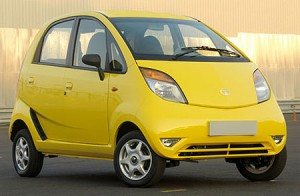As the anticipation and arguments build up ahead of Dubai Metro’s launch on 09.09.09, I’m reminded of another epochal event in the world’s transportation history – the launch of Tata Nano, the world’s cheapest car, in India.
 In fact, there’s a similarity – both the achievements are significant, yet have been constant subjects of scathing scepticism.
In fact, there’s a similarity – both the achievements are significant, yet have been constant subjects of scathing scepticism.
If it was the overcrowded ‘public transport’ and the lack of a cheap vehicle for an Indian ‘family of four’ that gave birth to the $2000 Tata Nano – it is the necessity to curb the burgeoning boom of private vehicles – that Dubai’s Road Transport Authority resolved to push ahead with a world-class ‘mass transport’ system.
If the Tata Nano-bashers waited to see whether the car would indeed hit the roads at its promised price of $2000, the Dubai Metro-bashers are rubbing their hands in delight with the prospects that not ‘all the stations’ would become operational on Sept 9, as the RTA had promised.
But even while ‘intellectuals’ have argued over the social, financial, political, economic and environmental implications of the projects – one sect of people would have been earnestly praying for the successful completion of these endeavours.
The father of the Nano, Ratan Tata saw from the comfort of his car – an Indian couple travelling on a two-wheeler scooter in the lashing rains – their little son standing at the front; the wife riding pillion, a child in her hand. Moved by their plight, he vowed to create the world cheapest car.
If you visit any of the bus-stops at Dubai’s Trade Centre roundabout, watch the anxiety and desperation on the faces of the low-wage and medium-wage-earning blue and white-collared workers, as they scramble to catch their bus.
Observe the disappointed shake of their head when they are asked by the bus driver to step down after a 30-minute wait – because the vehicle is loaded to its full capacity. You won’t understand what the Filipinos, the Malayalees or the Pathans mutter to themselves, but yes – you do know that their ‘tone’ is the same – of helplessness.
The Tata Nano is a blessing for the family who might have otherwise been drenched in the rains – choosing to ply riskily on its two-wheeler, wait for an eternity to be able to board a crowded train or a bus or plead before a cab or autorickshaw driver to drop them home. (Most of them don’t, especially if they think they won’t get a return fare.)
Are things different in Dubai for those at the Trade Centre R/A? It’s the sweltering heat here, the prohibitive taxi fares (the waiting charges have made it worse) and the long wait for their particular bus.
As for the arguments of inter-connectivity, the ones who in any case choose to walk a mile to their bus-stops – will they really crib much about finding their nearest Metro station?
They might not be the ones who would actively participate or even have an access to online polls slamming the Metro or bashing the city. But they surely have something that will keep them taking the train with pride and gratitude. Dire need.
For them, the Tata Nano or the Dubai Metro might offer a true vehicle of liberation and freedom.
















